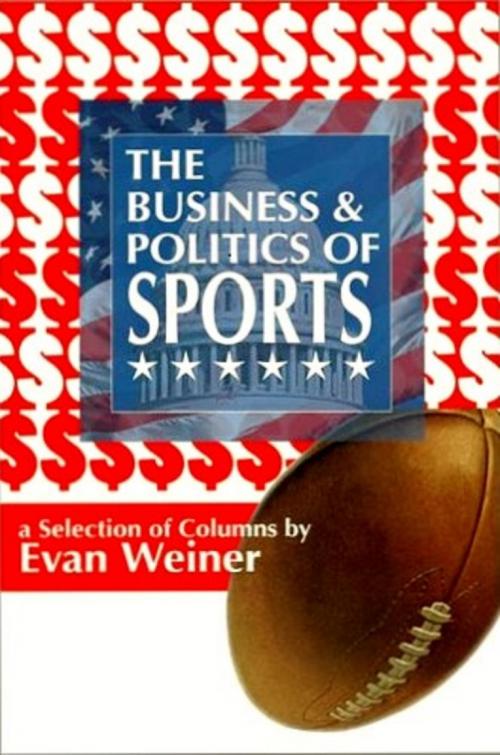The Business and Politics of Sports
Nonfiction, Sports, Baseball, Essays & Writings, Social & Cultural Studies, Political Science| Author: | Evan Weiner | ISBN: | 9781301664085 |
| Publisher: | Evan Weiner | Publication: | April 27, 2013 |
| Imprint: | Smashwords Edition | Language: | English |
| Author: | Evan Weiner |
| ISBN: | 9781301664085 |
| Publisher: | Evan Weiner |
| Publication: | April 27, 2013 |
| Imprint: | Smashwords Edition |
| Language: | English |
The Business & Politics of Sports contains over 100 of Evan Weiner’s columns written between 1998 and 2005 that describe the power plays, players, media and political (federal, state and local) connections, which rule the 19 billion dollar a year business of sports. At the heart of Evan Weiner’s writing lies his belief that “it’s great to watch a game and report on it, but democracy deserves more than a box score when it comes to scrutinizing the business of sports.” Mr. Weiner’s columns also delve fascinating aspects of urban planning and public policy.
He contends that the mindset of newspaper and magazine editors, along with radio and TV programmers, is that sports are merely games, the toy store of life. He disagrees, “More than ever sports is a multi-billion dollar business with global implications. General Electric is spending billions of dollars so that its NBC-TV network can broadcast the 2010 and 2012 Olympics. Communities all over America have created special tax districts, raised hotel, motel rent-a-car, restaurant, cigarette and beer taxes to fund stadiums and arenas. Congress may take up discrimination legislation against men-only member golf courses, change tax exemption laws as they apply to companies that are Olympic sponsors, and legislate the boxing industry. The House Committee on Government Reform has held hearings on sports leagues drug testing, specifically testing for anabolic steroids. Those issues aren’t found in the sandbox or the playground.”
“The public,” Mr. Weiner suggests, “needs to be aware of the relationship between politics, government, the media and sports ownership. Americans generally view sports as fans and do not realize how many hundreds of millions of their tax dollars go to big sports.” He calls upon editors and TV programmers to look at sports as more than an entertainment forum and opines that journalists also need to examine the sports industry because, “in the end, just about every American citizen has some money directly or indirectly invested in the sports industry.”
In The Business & Politics of Sports Mr. Weiner’s columns are divided into ten thematic chapters entitled Business, Colleges, Endorsement/Sponsorship, Labor, Events, Politics, Media, Stadiums, Olympics, and Fans and the Public. Laid out in an easy to read format, they progress in chronological order from 1998 to the present, showing the fascinating evolution of sports business.
The Business & Politics of Sports contains over 100 of Evan Weiner’s columns written between 1998 and 2005 that describe the power plays, players, media and political (federal, state and local) connections, which rule the 19 billion dollar a year business of sports. At the heart of Evan Weiner’s writing lies his belief that “it’s great to watch a game and report on it, but democracy deserves more than a box score when it comes to scrutinizing the business of sports.” Mr. Weiner’s columns also delve fascinating aspects of urban planning and public policy.
He contends that the mindset of newspaper and magazine editors, along with radio and TV programmers, is that sports are merely games, the toy store of life. He disagrees, “More than ever sports is a multi-billion dollar business with global implications. General Electric is spending billions of dollars so that its NBC-TV network can broadcast the 2010 and 2012 Olympics. Communities all over America have created special tax districts, raised hotel, motel rent-a-car, restaurant, cigarette and beer taxes to fund stadiums and arenas. Congress may take up discrimination legislation against men-only member golf courses, change tax exemption laws as they apply to companies that are Olympic sponsors, and legislate the boxing industry. The House Committee on Government Reform has held hearings on sports leagues drug testing, specifically testing for anabolic steroids. Those issues aren’t found in the sandbox or the playground.”
“The public,” Mr. Weiner suggests, “needs to be aware of the relationship between politics, government, the media and sports ownership. Americans generally view sports as fans and do not realize how many hundreds of millions of their tax dollars go to big sports.” He calls upon editors and TV programmers to look at sports as more than an entertainment forum and opines that journalists also need to examine the sports industry because, “in the end, just about every American citizen has some money directly or indirectly invested in the sports industry.”
In The Business & Politics of Sports Mr. Weiner’s columns are divided into ten thematic chapters entitled Business, Colleges, Endorsement/Sponsorship, Labor, Events, Politics, Media, Stadiums, Olympics, and Fans and the Public. Laid out in an easy to read format, they progress in chronological order from 1998 to the present, showing the fascinating evolution of sports business.















